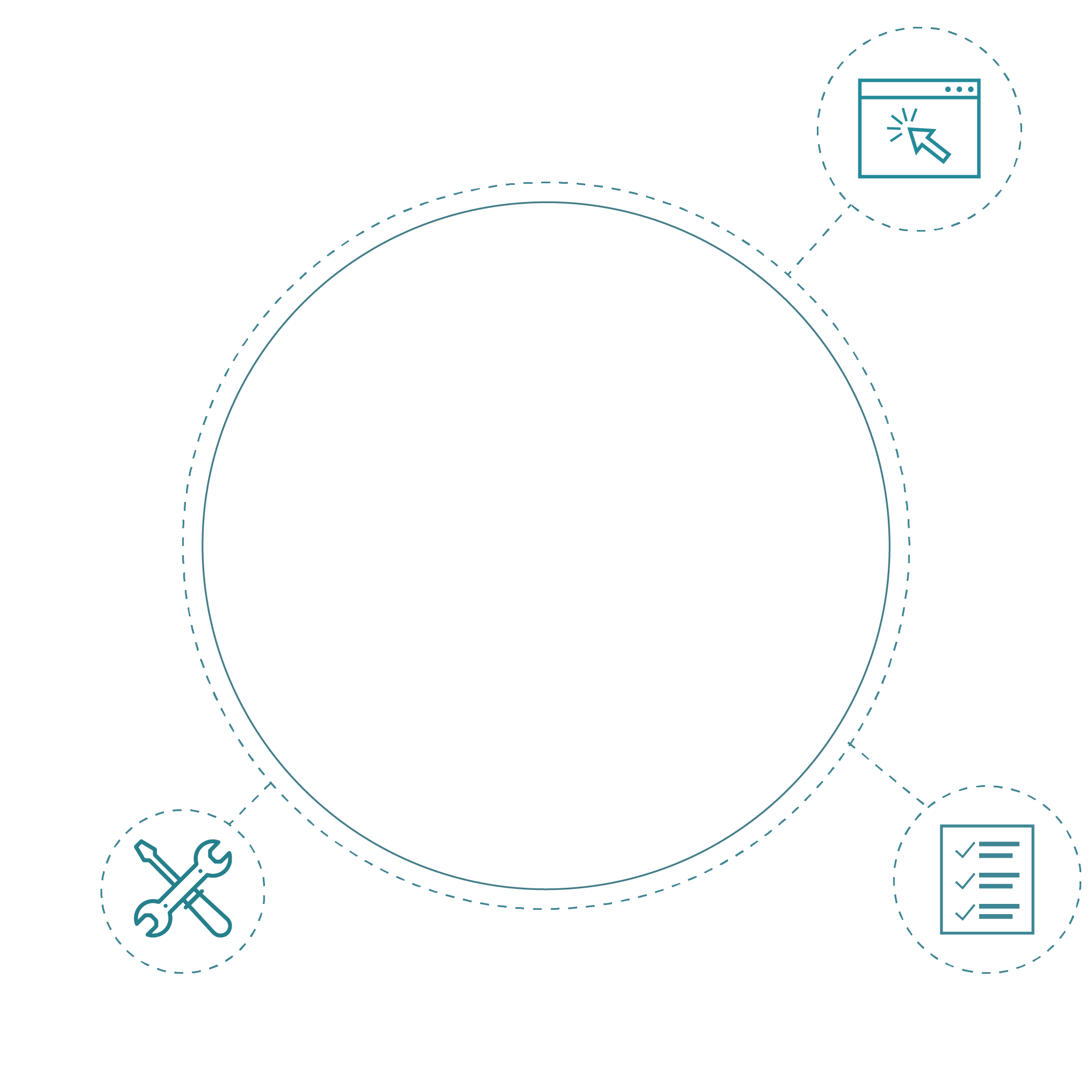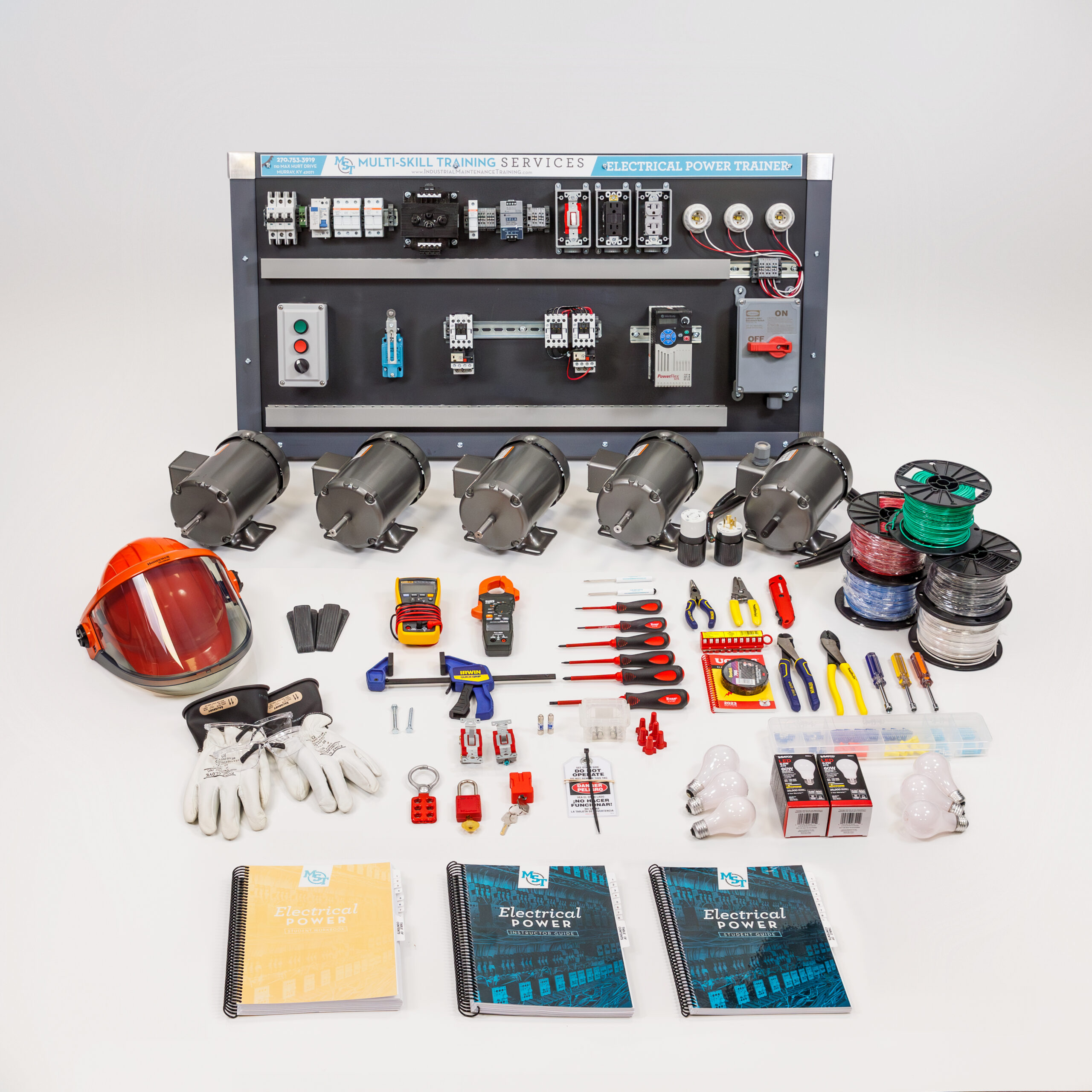Training Simulator (1)
Portable workstation with industrial, real world plant components
Matches perfectly to Lab Guide with step by step instructions
Folds up for easy storage
Non-skid rubber feet
Dimensions: 48″ x 20″ x 24″
MST’s Industrial Electrical Power Training provides a complete industrial electrical training course from a subject matter expert. Whether you choose to schedule onsite training or utilize our curriculum and simulator package, our customized solution will provide your employees with comprehensive electrical power training and experience. Schedule your electrical power training today!
To learn more about our various Industrial Maintenance Training Programs including Maintenance Fundamentals Training, Mechanical Training, Electrical Controls Training, Pneumatics Controls Training, Programmable Logic Control Training, or Analog Controls Training, contact us today.


Understanding Electricity, Voltage, Common Voltage Levels, Current, Resistance, Power, Conductors and Insulators, Heat, Ohm’s Law, Voltage/Current Relationship, Current/Resistance Relationship, Applications of Ohm’s Law, Using Ohm’s Law when Troubleshooting, Calculating Power Voltage and Current Using Power Formula, Power/Current Relationship, Applications Using Power Formula, Combining Ohm’s Law and Power Formula
Electrical Shock, Electrical Codes and Standards and Enforcement Agencies, Classes of Fire Extinguishers, Personal Protective Equipment, Grounding, Lockout/Tagout, Lockout Devices, Electrical Enclosures, Electrical Motor Safety
Meters, Meter Terminology, Digital Meters and Displays, Resistance, Bar Graphs, Ghost Voltages, Meter Precautions, Additional Features of Meters, Reasons for Measurements, Voltage, Current, In-Line Ammeter — DC Measurement, Clamp-On Ammeter — AC Measurement, Ohmmeter-Resistance Measurement, Megohmmeter-Resistance, Handout of Electrical Symbols
Characteristics of Series and Parallel Circuits, Series Connections, Current in Series Circuits, Parallel Connections, Resistance in Parallel Circuits, Voltage in Parallel Circuits, Power, Series/Parallel Connections, Resistance in Series/Parallel Circuits, Current in Series/Parallel Circuits, Voltage in Series/Parallel Circuits, Power in Series/Parallel Circuits
Types of Conductors, Conductor Selection, Types of Cable and Uses, Removal of Cable Insulators, Electrical Characteristics of Conductors, Properties of Conductors, Conductor Ratings, Connection Terminations, Plugs, Plug and Receptacle Ratings and Configurations, Overcurrent and Overcurrent Protection Devices (OCPDs), Overloads and Overload Protection, Types of Overcurrent Protection Devices
Circuits, Lamp Control, Types of Switches, Lamp Fixture Mounting, Lamp Control Circuits, Multiple Lamp Circuits, Switching Combinations, Receptacles, Switched Circuits, Two Separate Circuits, Grounding
The Concept of Magnetism, Electromagnetism, Solenoids, Transformers Operation Ratings Overloading and Cooling Methods, Sizing Three-Phase Transformers, Determining Single-Phase Transformer Current Draw, Determining Three-Phase Transformer Current Draw, Transformer Standard Ambient Temperature Compensation, Transformer Special Ambient Temperature Compensation, Single-Phase Residential Transformer Connections, Three-Phase Transformer Connections, Three-Phase Delta-to-Delta Connections, Three-Phase Wye-to-Wye Connections, Delta-to-Wye/Wye-to-Delta Connections, Transformer Load Balancing, Transformer Tap Connections, Single-Phase Transformer Parallel Connections, Three-Phase Transformer Parallel Connections
Fundamentals of Three-Phase Motors, Motor Construction, Reversing Motors, Multiple-Speed Motors, Troubleshooting Motors, General Motor Maintenance, Scheduled Maintenance, Water-Soaked Motors, Direct Current Motors, Troubleshooting for Grounded or Shorted Commutator Windings, Troubleshooting Single-Phase Motors and Shaded-Pole Motors, Troubleshooting Split-Phase Motors, Troubleshooting Capacitors Motors, Three-Phase Motors, Troubleshooting and Servicing Three-Phase Motors
Manual Switching, Mechanical Improvements, Manual Contacts, Double-Break Contacts, Contact Construction, Manual Starters, Motor Control Centers, Power Panels, Additional Contacts, Transient Suppression Modules, AC Manual Starter Selection, Phasing, Enclosures, Ratings of General Purpose AC/DC Contactors, Motor Protection, Selection of Starter Protection, Sizes of Fuses and Circuit Breakers, Overcurrent and Overcurrent Protection, Selection of Running Protection, Electronic Overloads and Overload Heater Selection, Overload Current Transformers, Inherent Motor Protectors, Troubleshooting Fuses Circuit Breakers and Running Protection Devices
Principles of Motor Controls, Control Language, Ladder/Line Diagrams and Wiring/Connection Diagrams, Types of Control Circuits, Contactors, Solenoids, Contactor Wiring, Control Circuit Voltage, Reversing Motors Using Manual Starters, Interlocking, Magnetic Reversing Starter Practical Applications, Starting/Stopping in Forward/Reverse with Limit Switch Acting Safety Stop, Reversing Motors Using Drum Switches, Troubleshooting Reversing Circuit Control Circuit and Power Circuits
Let us design the perfect one for you.
© 2026. Multi-Skill Training Services, Inc.